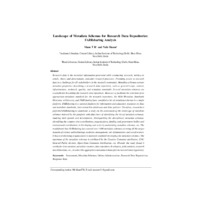Landscape of Metadata Schemas for Research Data Repositories: FAIRsharing Analysis
Metadata
Landscape of Metadata Schemas for Research Data Repositories: FAIRsharing Analysis
Research data is the recorded information generated while conducting research, writing an article, theses and dissertations, and other research processes. Providing access to research data is a challenge for all stakeholders in the research community. Metadata schemas contain metadata properties describing a research data repository, such as general scope, content, infrastructure, technical, quality, and metadata standards. Several metadata schemas are available for describing the research data repository. However, to facilitate the selection of an appropriate metadata standard for the research repository, the RDA Metadata Standards Directory, re3data.org, and FAIRsharing have compiled a list of metadata schemas in a single platform. FAIRsharing is a curated platform for information and education resources on data and metadata standards, inter-related to databases and data policies. Therefore, researchers preferred FAIRsharing to undertake a study on the assessment of the landscape of metadata schemas indexed by the platform with objectives of identifying the list of metadata schemas, studying their growth and development, distinguishing the disciplinary metadata schemas, identifying the country-wise contributions, organizations, funding and government bodies and institutional contributions in developing and actively maintaining metadata schemas, etc. The result found that FAIRsharing has covered over 1600 metadata schemas covering all the major domains of science and technology, medicine, management, arts & humanities, and social science. It has overwhelming organizations to maintain and fund developing the metadata schemas. The maximum of the metadata schemas is attributed by the Creative Commons attribution, GNU General Public License, Open Data Commons Attributions, etc. Overall, the study found it worthy for data curators, metadata creators, data repository developers, policymakers, research data librarians, etc., to select the appropriate metadata schema for the research data repository.
2023

